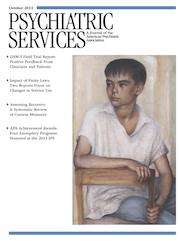The Pedagogy of Recovery
To the Editor: In 2009, the United Kingdom’s first Recovery Colleges began to emerge in London and Nottingham. These were sites of teaching and learning, established on the premise that education can empower people with mental illnesses and compensate for the debilitating effects of traditional psychiatric care. Today, hundreds of students are enrolled in these Recovery Colleges, taking a wide range of courses to meet their specific needs and interests. In contrast to the traditional medical model that focuses on symptoms and deficits, an educational paradigm seems more consonant with the principles of recovery in that it focuses on building strengths and achieving goals. Among the many courses offered are creating positive relationships, introduction to stress reduction, and understanding the benefits system. In this setting, people in recovery no longer assume the role of the patient in need of treatment; instead, they are students in pursuit of knowledge, who have the support of instructors who understand what it is like to live with mental illness (1).
What is implicitly understood among proponents of Recovery Colleges—and what we make explicit in this letter—is that using a conventional education model does not necessarily engender recovery-oriented service provision. Paulo Freire (2) argued that education could be oppressive when teachers exercise intellectual authority over their students, such that students merely act as containers to hold the information deposited into them by teachers. This is what Freire referred to as the “banking model” of education, which prevents students from developing critical consciousness—that is, the ability to see their own oppression and emancipate themselves from the myths and ideologies set forth by the dominant class. Alternatively, Freire posited a more egalitarian model of education known as “problem-posing dialogue,” which occurs when teachers and students exchange ideas and work collaboratively to coproduce knowledge that redresses the injustices of society.
Given the oppression experienced by people with mental illnesses, Freire’s notions of pedagogy pertain to them. Unfortunately, this oppression often comes from a banking model of mental health services, where power resides in the professional staff who diagnose problems and prescribe treatment while the person in recovery relinquishes control and waits to be “fixed” (3). Although Recovery Colleges appear to promote problem-posing dialogue (courses are often coinstructed by people with mental illnesses), educators must be mindful of the power they can have over their students when the spirit of pedagogy does not allow people to find their own solutions to and to become experts at managing their own lives.
We find it useful to frame recovery as an activity of teaching and learning because doing so helps expand our roles as providers. We must see ourselves as teachers who can engage in dialogue with people in recovery—combining our professional experiences with their personal experiences living with mental illness—to inspire them to investigate their own problems, arrive at their own conclusions, and choose their own paths. But perhaps most important, we must learn to become avid students, because we often underestimate how much we have yet to learn and how much people in recovery have to teach us.
1 : Recovery Colleges. London, Centre for Mental Health, 2012. Available at www.centreformentalhealth.org.uk/recovery/Recovery_Colleges.aspx. Accessed June 12, 2013Google Scholar
2 : Pedagogy of the Oppressed. New York, Continuum, 1970Google Scholar
3 : The recovery movement; in Mental Health Services: A Public Health Perspective, 3rd ed. Edited by Levin BL, Petrila J, Hennessy KD. New York, Oxford University Press, 2010Google Scholar



